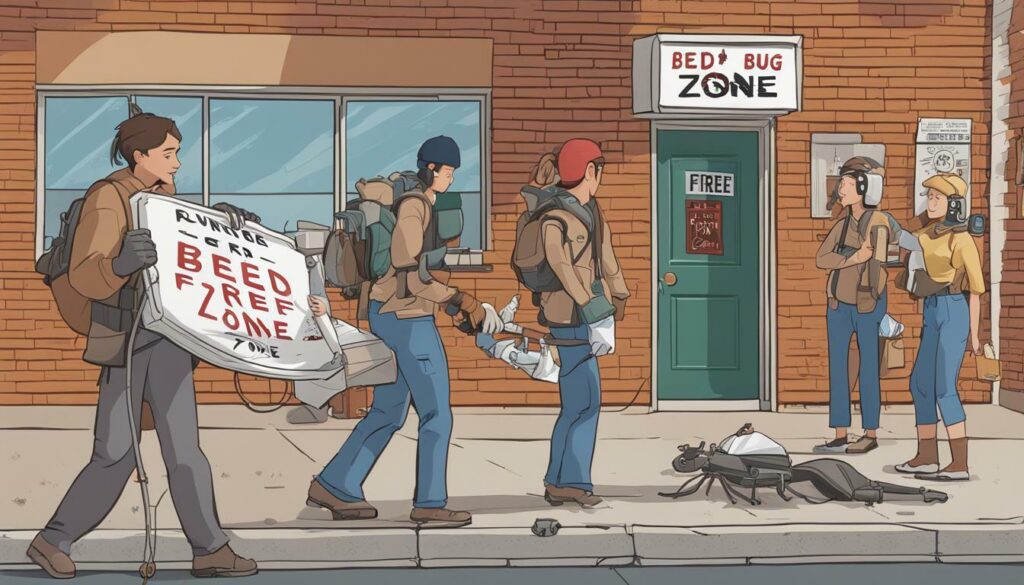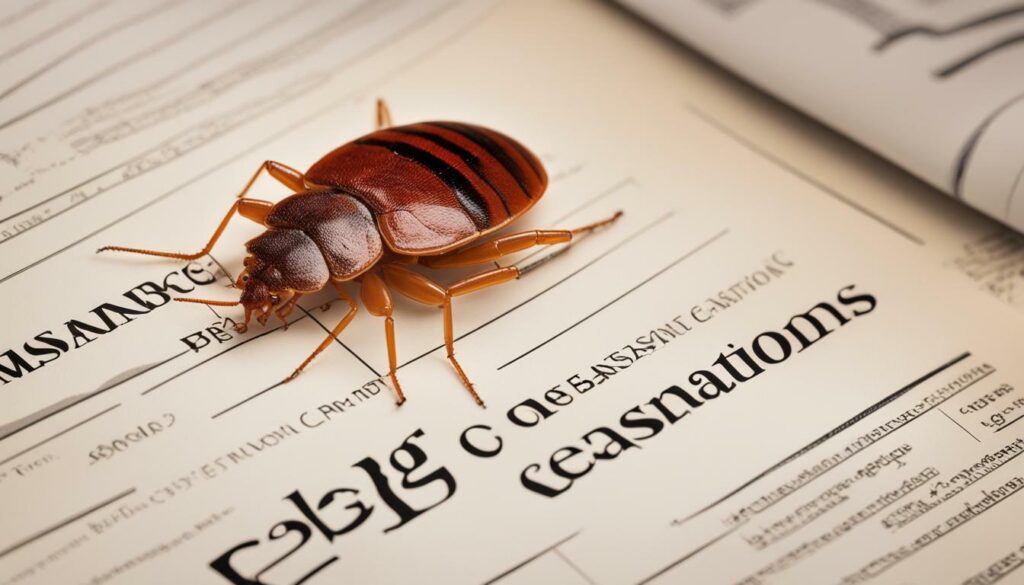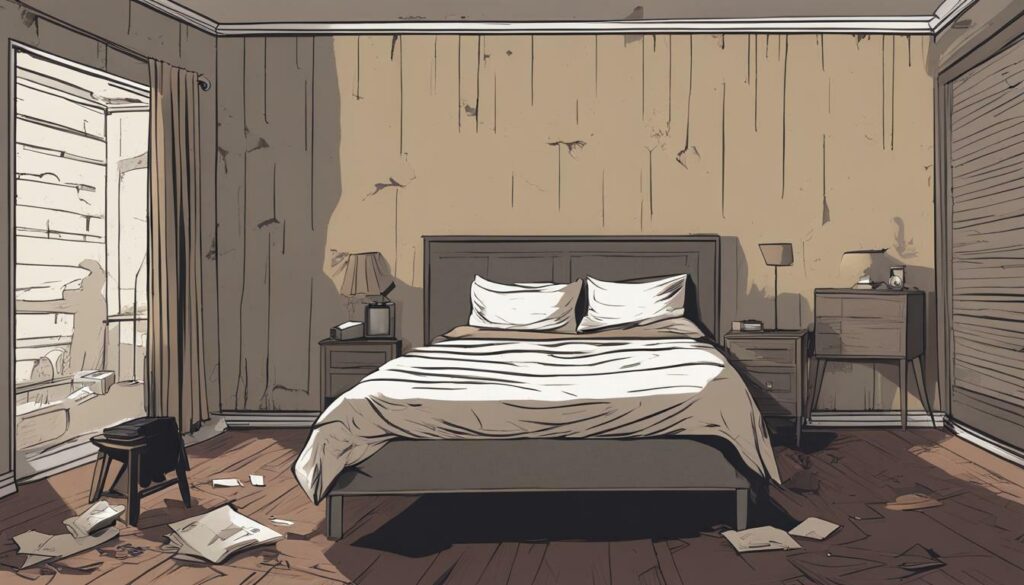As a renter, you likely know about the importance of having renters insurance. But what about bed bugs? Are they covered by your policy? Unfortunately, the answer is not straightforward. Many renters mistakenly believe that their insurance will protect them from bed bug infestations, only to find out too late that they are not covered.
So what should you do? In this article, we’ll explore the ins and outs of renters insurance coverage for bed bugs. We’ll examine what your policy typically covers, what it doesn’t, and what options you have if you do find yourself facing a bed bug infestation. By the end of this article, you’ll have a better understanding of how to protect yourself and your belongings as a renter.
Key Takeaways:
- Many renters mistakenly believe that their insurance will protect them from bed bug infestations.
- Renters insurance typically excludes bed bug infestations but may cover certain related costs.
- There are additional coverage options that renters may consider to protect themselves against bed bug infestations.
- Renters should take proactive measures to prevent bed bug infestations and should notify their landlords and seek professional help if they discover an infestation.
- Renters should document all expenses related to bed bug infestations and explore potential avenues for seeking compensation through their insurance policies.
Understanding Renters Insurance Coverage
As a renter, it’s important to understand what your insurance policy covers, especially when it comes to bed bugs. Renters insurance is designed to protect you from financial loss due to unexpected situations, such as theft or damage to your personal belongings. It also provides liability coverage in case someone is injured on your rented property.
When it comes to bed bugs, renters insurance primarily covers liability. This means that if a guest or visitor to your property contracts bed bugs and decides to sue you, your insurance policy may cover the legal expenses and any damages awarded. However, it’s important to note that your policy may not cover the cost of exterminating the bed bugs or any related damage to your personal belongings.
To fully understand your policy’s coverage for bed bugs, it’s important to review your contract carefully and consider speaking with your insurance provider directly. They can explain the specific terms and limitations of your policy and advise you on any additional coverage options that may be available.


In some cases, your landlord may be responsible for covering the cost of bed bug extermination and related damages. Check your lease agreement to see if this is the case.
Examining Bed Bug Infestations
Bed bugs are small, reddish-brown insects that feed on human blood. They are notoriously difficult to detect and can quickly infest an entire space. As a renter, it’s important to be aware of the signs of bed bug infestations and take prompt action to prevent the spread of these pests.
One of the biggest challenges of bed bugs is that they can hide in many places, including mattresses, furniture, and carpeting. They can also spread easily between apartments and rooms, making it crucial to address the problem as soon as possible.
If you suspect that you have a bed bug infestation in your rental property, it’s important to act quickly. Contact your landlord or property management immediately to request an inspection. The next step is to hire a licensed pest control professional to determine the extent of the infestation and develop a treatment plan.


Professional extermination is usually necessary to eliminate bed bugs completely, as these pests are resistant to many do-it-yourself treatments. It’s also important to note that bed bug extermination can be costly.
If you have renters insurance, check your policy to see if it covers the cost of bed bug extermination and related expenses. Many policies do not cover bed bugs specifically, but may cover certain related costs such as replacing belongings or temporary housing if necessary.
Reviewing Renters Insurance Policies
As a renter, it’s important to review your insurance policy regularly to ensure you have adequate coverage in case of a bed bug infestation. Start by searching for bed bug coverage in your policy documents.
Look for terms such as “pest coverage” or “insect coverage” which may indicate coverage for bed bugs. Additionally, check for any exclusions or limitations related to bed bug coverage. Some policies may exclude coverage for bed bug extermination, while others may limit the amount of coverage available.
If you have questions about your policy or are unsure about the extent of your coverage, don’t hesitate to contact your insurance provider for clarification.
Does Renters Insurance Cover Bed Bugs?
It’s a common question among renters: are bed bugs covered by renters insurance? Unfortunately, standard renters insurance policies typically exclude bed bug infestations from coverage. This means that if your rental unit becomes infested with bed bugs, your insurance policy will not cover the cost of extermination or any damages caused by the infestation.
However, there are some situations where your renters insurance policy may cover certain bed bug-related costs. For example, if your landlord is found responsible for the infestation due to negligence or failure to maintain the property, their liability insurance may cover your damages. Additionally, if your belongings are damaged or lost due to the infestation, your renters insurance policy may provide coverage for the loss.
It’s important to carefully review your renters insurance policy to understand what is and isn’t covered in the event of a bed bug infestation. Look for any mention of bed bug coverage or exclusions in your policy documents.


While renters insurance may not cover bed bug infestations as a standard policy, you do have options for additional coverage. Some insurance providers offer specific bed bug endorsements or riders that can be added to your policy for an extra fee. These endorsements typically provide coverage for extermination costs and related expenses.
If you discover a bed bug infestation in your rental unit, be sure to take immediate action. Contact your landlord and schedule professional extermination services. Document the infestation with photographs and written descriptions, as well as any expenses you incur as a result of the infestation. If your renters insurance policy covers any of these expenses, you will need to file a claim with your insurance provider.
Remember, prevention is always the best course of action when it comes to bed bugs. Regularly inspect your rental unit for signs of infestation, such as blood stains on bedding or furniture, or small dark spots on walls or floors. Take proactive measures to safeguard your belongings, such as using bed bug-proof mattress and box spring covers and regularly washing and drying your linens on high heat.
While renters insurance may not offer complete coverage for bed bug infestations, it’s still important to have a policy in place to protect your assets in case of unexpected events. Consider reviewing your policy documents and speaking with your insurance provider to ensure you have the coverage you need.
Additional Coverage Options
If you’re worried about bed bug infestations in your rental property, you may want to consider additional coverage options to protect yourself. Some insurance companies offer specific bed bug protection as an add-on to your renters insurance policy. This coverage can help cover the costs associated with bed bug extermination and replacement of damaged items.
To obtain this additional coverage, contact your insurance provider and inquire about their bed bug protection options. You may be required to pay an additional premium, but the peace of mind it provides can be worth it.
If you do end up having to deal with a bed bug infestation, it’s important to know how to file a claim with your renters insurance. Start by documenting all expenses related to the infestation, including extermination costs and replacement of damaged items. Then, contact your insurance provider to file a claim.
Be prepared to provide documentation of the infestation and the expenses you’ve incurred. Your insurance provider will review your claim and determine whether your policy covers the costs. If so, they will issue a payment to reimburse you for your expenses.


Prevention and Proactive Measures
Dealing with bed bugs can be a nightmare for any renter. However, there are steps you can take to prevent bed bugs from infesting your rental property. By taking these proactive measures, you can safeguard your belongings and avoid the need for costly extermination services.
One of the most effective ways to prevent bed bugs is to inspect your rental property regularly. This includes checking the furniture, carpets, and bedding for any signs of infestation. If you notice any red or rust-colored stains, shed bed bug skins, or live bugs, you should take immediate action.
Another way to prevent bed bugs is to seal any cracks and crevices in your rental unit. Bed bugs can easily enter your property through small gaps and holes in the walls, floors, and ceilings. By sealing these openings with caulk or foam, you can make it harder for bed bugs to infiltrate your space.
When purchasing new furniture or bedding, it’s essential to inspect it thoroughly before bringing it into your rental property. Bed bugs can hide in the seams and folds of these items, making it easy for them to spread throughout your home.
Finally, it’s important to practice good hygiene and cleanliness in your rental property. This includes washing your bedding and clothes regularly in hot water, vacuuming your floors and carpets frequently, and keeping your living space clutter-free.


By taking these preventative measures, you can significantly reduce the risk of a bed bug infestation in your rental property. However, if you do discover bed bugs, it’s crucial to take immediate action and seek professional help. Remember that renters insurance may not cover the costs of extermination or property damage caused by bed bugs.
What to Do If You Have Bed Bugs
Discovering a bed bug infestation can be a stressful and frustrating experience, but it’s crucial to take immediate action to minimize the damage and prevent the problem from spreading. As a renter, there are several steps you should take to deal with bed bugs effectively:
- Notify your landlord: As soon as you suspect or confirm that you have bed bugs, you should inform your landlord or property manager. They may have specific protocols or resources in place to address the infestation, and they have a legal responsibility to provide a safe and habitable living environment.
- Document the infestation: Take photos or videos of the affected areas and any signs of bed bugs, such as eggs, shed skins, or bloodstains. Keep track of any expenses you incur related to the infestation, including extermination costs and replacing damaged belongings.
- Seek professional help: Attempting to treat a bed bug infestation on your own can be risky and ineffective. Instead, hire a licensed pest control company that specializes in bed bug eradication. They will inspect your unit, identify the extent of the infestation, and develop a customized treatment plan.
It’s important to be cooperative and proactive throughout the extermination process. Follow any instructions or guidelines provided by your landlord or pest control professional, such as preparing your unit for treatment, washing and drying your bedding and clothing on high heat, and vacuuming thoroughly.
If you experience any adverse health effects from the bed bug bites, such as itching, swelling, or an allergic reaction, seek medical attention promptly. Your renters insurance policy may cover medical expenses related to bed bug bites, depending on the coverage.
Dealing with a bed bug infestation can be overwhelming, but with the right approach, you can minimize the impact and protect yourself from further harm.


Seeking Compensation for Bed Bug Infestations
If you have experienced a bed bug infestation in your rental property, you may be wondering if your renters insurance policy covers any related damages or losses. The good news is that some policies may provide coverage, depending on the specifics of your situation. However, it’s important to note that not all insurance policies cover bed bugs, and there may be limitations and exclusions to consider.
The first step in seeking compensation for bed bug-related expenses is to review your renters insurance policy carefully. Look for any mention of bed bug coverage or exclusions in the policy language. If you are unsure about what the policy covers, contact your insurance provider directly to ask for clarification.
If your policy does cover bed bugs, you may be able to file a claim for any expenses related to your infestation. These may include costs for professional extermination services, replacing damaged or infested personal belongings, and any medical expenses resulting from bites or related health issues.
It’s important to document all expenses carefully and keep records of any communication with your insurance provider. Provide any necessary evidence to support your claim, such as photos of infested items or invoices for related services. Be prepared to provide a detailed account of your situation and any actions you took to address the infestation.
Keep in mind that there may be limitations to your coverage, such as a maximum payout amount or a deductible that you must meet before your insurance kicks in. Additionally, some policies may only cover specific types of expenses, so it’s important to understand your policy’s limitations and exclusions.
If your policy does not cover bed bugs or if your claim is denied, you may have other options for seeking compensation. Consider consulting with a legal professional who can advise you on your options for pursuing compensation from your landlord or property management company.
In any case, it’s important to take swift action if you discover a bed bug infestation in your rental property. Reporting the infestation to your landlord or property management company promptly can help prevent the problem from spreading and may help you seek compensation for related expenses.


Exceptions and Limitations
While renters insurance can offer some protection against bed bug infestations, there are exceptions and limitations to be aware of. Most standard renters insurance policies explicitly exclude coverage for bed bug infestations or related damages. This means that if your rental property becomes infested with bed bugs, your insurance provider will likely not cover any costs associated with the extermination or replacement of infested items.
Even if your policy does cover bed bug-related expenses, there may be limitations on the amount of coverage available. For instance, some policies may cap coverage for bed bug extermination at a certain dollar amount, leaving you responsible for any costs beyond that limit. Additionally, many policies may only cover certain types of losses or damages, such as those related to personal property or liability claims.
It’s important to carefully review your renters insurance policy to understand any exceptions or limitations that may apply to bed bug coverage. If you have any questions or concerns, reach out to your insurance provider for clarification.


Conclusion
As a renter, it’s vital to understand how your renters insurance policy covers bed bug infestations. While standard policies typically exclude bed bugs, you may be able to claim related expenses under certain circumstances.
If you’re concerned about bed bugs, take proactive measures to prevent infestations and regular inspections of your rental property. If you discover a bed bug infestation, notify your landlord immediately and seek professional help. Document all expenses related to the infestation for potential compensation.
Be sure to review your renters insurance policy for any mention of bed bug coverage and consider additional coverage options if needed. Understanding your coverage can give you peace of mind and protect you from financial losses due to a bed bug infestation.
FAQ
Q: Does renters insurance cover bed bugs?
A: No, standard renters insurance policies typically exclude coverage for bed bug infestations. However, they may cover certain related costs, such as damage to furniture or belongings caused by bed bugs.
Q: What should renters do if they discover a bed bug infestation?
A: Renters should notify their landlord immediately and document the infestation with photos or videos. They should also seek professional help for extermination and follow any instructions provided by the pest control experts.
Q: Can renters file a claim with their insurance for bed bug-related expenses?
A: While bed bug infestations are generally not covered by standard renters insurance policies, renters may be able to file a claim for certain expenses that are related to the infestation, such as replacing damaged furniture or personal belongings.
Q: Are there any additional coverage options for bed bug protection?
A: Some insurance companies offer optional coverage for bed bug infestations. Renters should review their policies or speak with their insurance provider to explore any additional coverage options available to them.
Q: How can renters prevent bed bug infestations?
A: Renters can take proactive measures to prevent bed bug infestations by regularly inspecting their living spaces, keeping their belongings clean and clutter-free, and taking immediate action if they notice any signs of a bed bug infestation.
Q: What should renters do if they need compensation for bed bug-related damages?
A: Renters should document all expenses related to the bed bug infestation, including receipts for extermination services and any damaged or discarded belongings. They can then consult their insurance policy and consider filing a claim for reimbursement or seeking legal advice if necessary.
Q: Are there any exceptions or limitations to renters insurance coverage for bed bugs?
A: Yes, there may be exceptions or limitations to coverage for bed bugs in renters insurance policies. It is important for renters to carefully review their policies and understand any specific exclusions or conditions that may apply.







